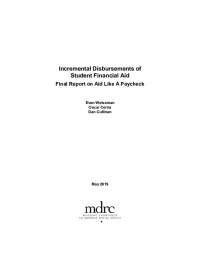Incremental Disbursements of Student Financial Aid
Final Report on Aid Like A Paycheck

Financial aid plays an essential role not only in allowing many students to enroll in college but also in supporting them in attaining completion and success. Often, however, the total amount of aid does not come close to covering the cost of attendance for full-time students. As a result, the majority of students enrolled at two-year public institutions report feeling financial stress related to paying for school. Students often work while attending college to cover the full cost of attendance, but time spent working can have a negative impact on their academic success.
MDRC launched Aid Like A Paycheck to test whether changes to the timing of student aid disbursement could help students stretch their financial aid to cover their expenses throughout the term, and whether such a policy could improve students’ academic and financial outcomes. Most colleges distribute financial aid refunds to students in one or two lump sums during the term. Aid Like A Paycheck tested an alternate approach, in which financial aid refunds were disbursed biweekly, with the goal of helping students better budget their existing financial aid.
MDRC conducted a mixed-methods evaluation of incremental financial aid disbursements at two community college systems in and around Houston, Texas, and at a third system in California’s rural Central Valley. At the two institutions in Texas, the study included a randomized controlled trial that gathered data from nearly 9,000 students and tracked them for up to two years. The final findings from the study indicate that biweekly disbursements do not result in substantial impacts on student outcomes:
-
Students assigned to receive biweekly disbursements and those assigned to receive their aid in the standard way received the same total amount of financial aid.
-
Biweekly disbursements reduced students’ debt to the college in the first semester, but this reduction in debt was no longer evident at the end of the fourth semester.
-
On average, there is no evidence of biweekly disbursements improving students’ key academic outcomes.
-
There is little evidence that the participating colleges or the government saved money by implementing biweekly disbursements.
-
Implementation of the policy was costlier than — and not as simple as — expected, even when implemented without the constraints of the randomized controlled trial design.
Overall, the study suggests that incremental disbursements neither hurt students nor substantially improve their academic or financial outcomes.






